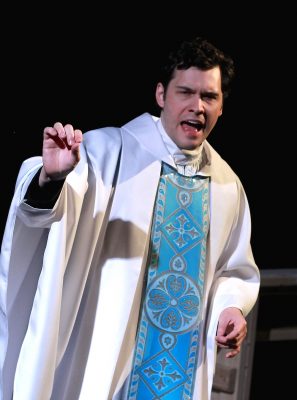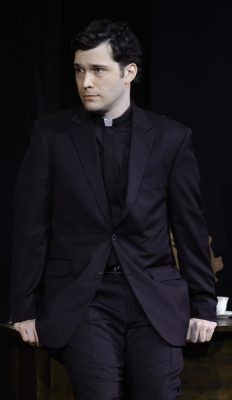Elliott Kashner nearly became a lawyer.
When the 31-year-old actor, who plays Father Flynn in Quotidian Theatre’s production of “Doubt: A Parable,” first came to the D.C. area from his hometown of York, Pa., it was on a full scholarship to George Mason University to study economics.
“I didn’t do a play there until my senior year,” he said. “And at the same time, I was applying to law school, but halfway through the process, I decided it wasn’t for me.”
His role in “As Bees in Honey Drown” did not convince Kashner to go directly into acting, but it opened him up to a world of possibilities beyond the law—even though, ironically, the profession has colored a lot of his work, from his two-year gig as a staffer in “House of Cards” on Netflix to his current role in “Doubt” at Quotidian Theatre.

“I think approaching character in a lot of ways uses the analytical and logical processes that inspire law work,” said Kashner. “You have to examine the text and make determinations, especially in a script like this–what your character is saying about himself, what other characters are saying.
“Some of the things are true and some are false; that provides the framework for the story.”
That he approached the play—his favorite—by John Patrick Shanley (author of “Moonstruck”) in such a logical manner should be intriguing to fans of “Doubt,” which won the 2005 Pulitzer Prize for Drama and Tony Award for Best Play and was turned into an Academy Award-nominated film starring Philip Seymour Hoffman, Meryl Streep, Amy Adams and Viola Davis. The story, regarding a nun’s suspicions about the behavior of a parish priest, is known for its lack of definitive resolution: the truth lies in the minds of the audience members—and everyone is free to draw their own conclusion.
“John Patrick Shanley did an interview for a couple of representatives from Quotidian Theatre,” said Kashner. “And they opened up the questions to the members of the cast. Did I want to ask him anything?”
It was a question the actor mulled over before deciding he’d rather not.
“Once the script is published, I think John Patrick Shanley’s views on the character—at that point—don’t matter,” he explained. “If it’s not in the script, it’s information the audience doesn’t have.”
And the audience is key for Kashner. He believes their experience of “Doubt” should be based on what the four actors on the stage say and do, that “the play is grounded in the way it’s presented.
“You’re seeing real people responding naturalistically to the circumstances that are happening, but the construction of the play is a parable, and it’s constructed to prove a point.”
And that point relates back to the play’s title, and the physical–and metaphysical–realities of truth and doubt. “In this scenario, the truth is unknowable,” said Kashner. “The facts of the story don’t answer the questions; the audience must live with doubt.”

Although he plays a Catholic priest in “Doubt,” Kashner grew up in a loosely Presbyterian tradition. “I kind of bounced around and never really latched onto a religion,” he said, noting that he did delve into what he would need to understand as Father Flynn. “There’s a good amount of research required, just so you understand everything that’s referred to in the text.
“But you do verge on what I call analysis paralysis,” he added. “You can spend so much time doing research that you forget to invest in the show and what’s happening in the moment.”
Kashner sees “Doubt” as less a recounting of the real-life abuse scandal within the Catholic Church–a subject captured in popular culture most recently by the 2016 Academy Award-winning “Spotlight”–than a reckoning of what we believe and why. He pointed out that its author said the buildup to the 2003 invasion of Iraq inspired “Doubt”–when “doubt” about Saddam Hussein’s weapons of mass destruction was perceived as weakness rather than wisdom.
“Here we were as a nation, caught in doubt—we have evidence that he does, we have evidence that he doesn’t— but we still had to find a way to move forward,” said Kashner. “To me, that’s why the play transcends the Catholic Church specifically, because that notion of being in doubt applies itself to lots of different scenarios.”
But he is playing a Catholic priest, and Kashner knows that in a language-led play like this one, with just four characters, he needs to be hyper-aware of what the audience sees when they look at him. He calls the technique he employs “acting backwards.”
“I feel like this script is more about how characters appear, that a lot of people are going to look at the characters’ physicality,” he explained.
“You’re constantly giving the audience information, so you have to work backwards. What is the audience judging? What do I want to give them? What are the choices I need to make?”
That is not unlike the way a lawyer tries to read and impress a jury. The actor who almost became a lawyer pointed out that the court system knows exactly what to do with doubt because it has a process in place to deal with it. Other institutions, not so much.
“But being in doubt is an uncomfortable place to be as a human.”
Quotidian Theatre Company presents John Patrick Shanley’s “Doubt: A Parable” at The Writer’s Center, 4508 Walsh St., Bethesda, through May 7. Performances begin at 8 p.m. Fridays and Saturdays and 2 p.m. Sundays, with an additional 2 p.m. Saturday matinee on May 6. Tickets are $30; $25 for seniors and $15 for students. Call 301-816-1023 or visit www.quotidiantheatre.org.